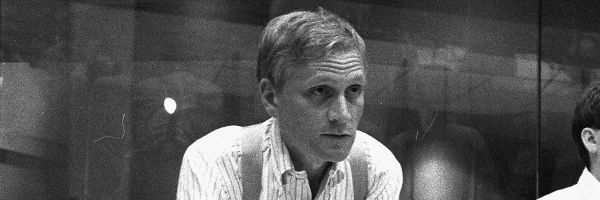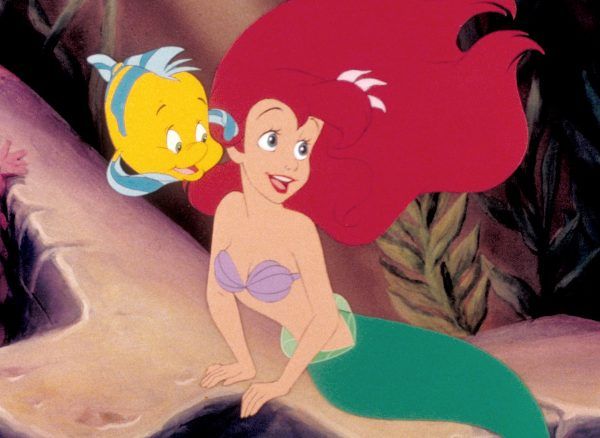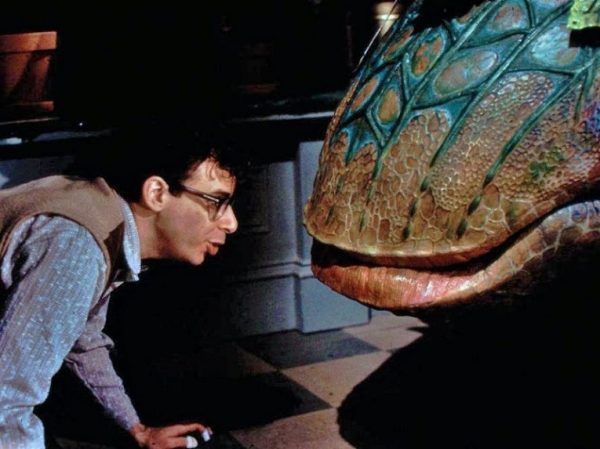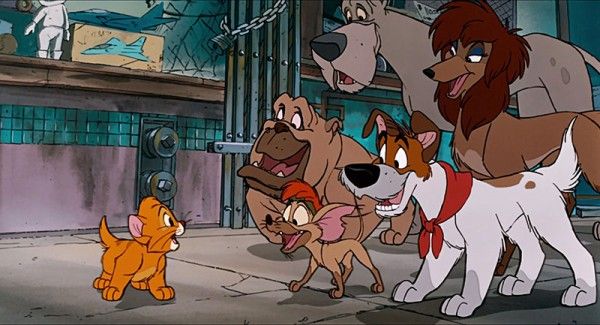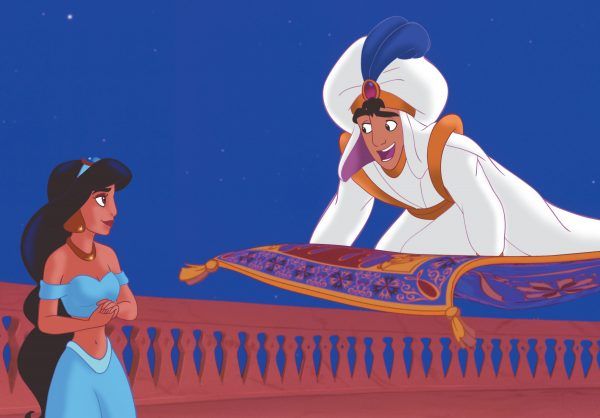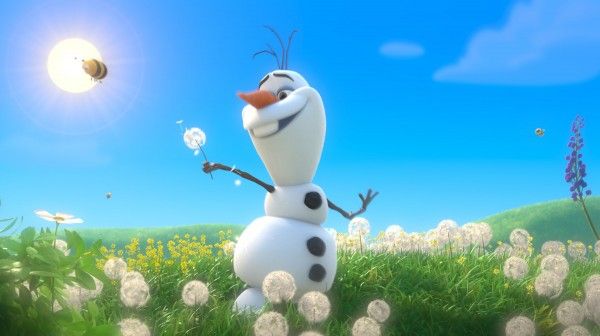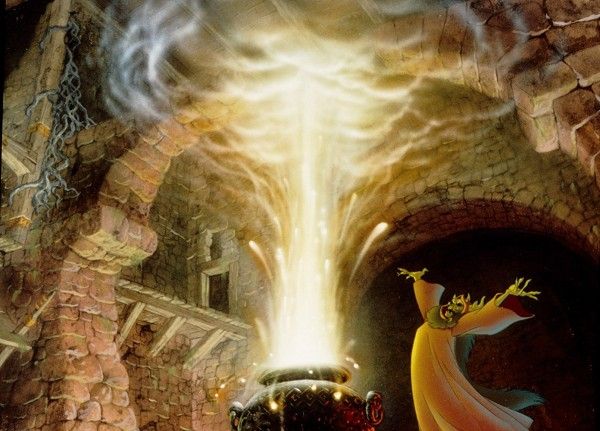Howard Ashman is somebody who has undoubtedly shaped you, even if you don’t know his name. He is the lyricist and storyteller who worked on The Little Mermaid, Beauty and the Beast and Aladdin. Without Ashman, it’s questionable whether or not Disney Animation would have had its glorious renaissance through the late 1980s and into the 1990s. Ashman proved that these movies were still viable in a modern entertainment landscape. Of course, the reason why we didn’t get more from Ashman is that he died, tragically, at the age of 40, from AIDS.
If you didn’t know his story, or would love to know more, then Don Hahn has you covered. Hahn, who produced the original animated Beauty and the Beast and who worked alongside Ashman for years, has directed Howard, an absolutely amazing new documentary debuting on Disney+ this Friday, August 7. Utilizing old photos, behind-the-scenes videos, and promotional materials, alongside newly recorded interviews, Hahn paints the picture of Ashman as a restless, highly emotional creative genius who was taken from us far, far too soon.
Chatting with Hahn over Zoom, we covered how this film was born out of his previous documentary Waking Sleeping Beauty (also excellent, also on Disney+), how much the film changed from its Disney Cruise Line and Tribeca screenings, what it was like making the first Disney film with a gay protagonist, and what the subject of his next documentary could possibly be.
COLLIDER: At what point did you start thinking about doing this documentary? Was it while you were making Waking Sleeping Beauty?
HAHN: Yeah, for a while I thought maybe Waking Sleeping Beauty would have been a Howard documentary, but it was a miracle enough that that movie got made and became the story that it was. So when that came out, which was a story more about executives and palace intrigue and that kind of thing, it was always in the back of my mind.
But I never thought of making a movie. I just thought oh, there's more story to tell here. And his sister was thinking about doing a biography and there were other things being talked about. And so I had lunch with his sister about four years ago and just said, blurted out of the blue, like an impulse buy at the checkout counter and just said, "I'm going to make a movie about Howard." And she was very sweet about it. I'm sure she didn't believe me. And she said later she didn't think that it would ever get done.
And it became, I guess an obsession would be the word. Because I thought... I know all the players, I have a lot of archival footage or access to the archival footage. And even though I worked with Howard, I didn't know a lot about him. It's like you work with a lot of people and don't really know their personal lives. I started digging and it became clear early on I wanted Howard to tell his own story because he was so articulate whatever he spoke, whether it was on radio or TV or whatever. It was compelling and interesting and instructive. And I just thought, Well, let's do that.
The first year I spent in the Library of Congress where his papers are and just around town, trying to dredge up things that have never been seen before and there were tons of amazing things out there that just really helped tell the story. So that's kind of the genesis of it all.
Was there something that you stumbled upon that was particularly revelatory to you?
HAHN: Well, yeah, he and Alan did a panel discussion at the 92nd Street Y in New York. And we were pretty sure it was not filmed because they just didn't film. And after checking with them, they looked on their shelves and they actually had an audio recording of it so it's in the movie.
It was really revealing because Howard was talking really frankly about there not being a big future on Broadway for his kind of traditional musicals. And maybe in animation, they hadn’t started really working with animation yet. It was a real crossroads after Smile. He was okay with the live-action movie of Little Shop of Horrors but was not thrilled with it. That interview in particular revealed a lot about where he was in life and what he was thinking.
And then we found other interviews. Indiana University had a video tape on their shelf, an interview from 30 years ago that they had never taken off the shelf. It was just sitting there. It was a sit-down interview with Howard. So that was a big 15-minute chunk of interesting biography. So those kinds of things became really important to me because they hadn't been heard before, and it was Howard talking more honestly about his life and his technique. We found a radio interview in New York that it hadn't been heard, that was more biographical, with him talking about his childhood. All those pieces came together really well once we started doing the research for it.
Like Waking Sleeping Beauty, this is all audio interviews, along with archival footage and vintage photographs. Was that always the plan from the beginning?
HAHN: You know, I was open to anything. I wasn't quite sure what it was going to be. I wasn't even sure if it was feature-length, I thought, Well, this might be a half hour. But when I thought I had plenty of material to make it a feature, the same thing happened that happened on Waking Sleeping Beauty – I tried to cut in new interviews with new talking heads and it just seemed to pull you out of the movie because you're cutting from this reasonably crappy VHS low-res material to like a 4K image of Don Hahn 30 years later. And it's off-putting and shocking. Cutting to an image of me in any case is off-putting.
So I went back to something that worked on Waking Sleeping Beauty, that I love even more on this movie, which is just transport you back to the eighties and nineties and let you sit at the tables I was at and let you be there with Howard. And hopefully the audience is forgiving of the quality of the tape and the film. And we restored it as much as we could, but I think the main thing was to let Howard tell his story and stay out of the way. Do no harm. And that's kind of what led it all.
Well, there's some notable omissions, in terms of people who you got to talk to. Did you try to get David Geffen to talk?
HAHN: I did.
Okay.
HAHN: He was reasonable and not disinterested, but we never really focused on it that much. And in the end I tried to stay to people that were much more personal. I would have loved to have gotten him to be really honest. But it just didn't work out for whatever reason.
Did you ever have stuff in the documentary related to Howard's work on Oliver & Company?
HAHN: I did. I did. He wrote a terrific song for Oliver & Company. And it was noteworthy in that it was his first song there just like the Tina Turner script was his first thing at Disney. But in the end I pulled it out because it was kind of a detour. And I felt like unless I could play some of the song or show some of the production, it just became shoe leather, just to cover that as a biographical point.
So yeah, the first cuts of the movie were three-hours long. And after a while, I just thought I have to focus on what is important in the end. I found a tape in the Library of Congress of Howard and Tina Turner talking and visiting while she's making sandwiches. There’s a 90-minute tape of him just asking her about her life and how she grew up and what she'd like to have in the script. And that's a movie in itself. But again, in the end Howard’s script wasn't produced literally. It went off the rails and it just was a sidebar, so it was enough to just touch on it and move on.
Was that period interesting for you, though, his transition from going to the studio and then making his way to animation?
HAHN: Yeah, really interesting because he was so pissed off at Broadway. You know, the critics, the atmosphere. He never really made it on Broadway until a few years ago when Aladdin and those kinds of things started happening on Broadway.
It’s a really interesting period. And I think that's what was able to lead him to Jeffrey, and Geffen was able to lead him to Jeffrey, and that turned into a great escape for him. He was able to come to California and work for a long time until he got too sick to travel. But I think that got Howard out of his head. It got him out of New York. It got him away from all that and into some really immersive projects to start out with. So that was a really important time in his career.
I know you've been working on this thing what for I'm sure it feels like forever to you. But there were public screenings, I think somebody said they saw an early version on the Disney Cruise Line in 2017. So can you talk about the evolution of that version to the version that we're all getting on Disney+?
HAHN: It's a slightly amusing story because I wanted to audience test it and I had showed it to family and friends and, as much as I love them, you can never quite trust them to tell you the truth. So I love putting it in front of a real audience. Maybe it's my Disney training from David Katzenberg, but you want to get the real audience reaction.
And I thought, What's the only safe place where there's no Wi-fi and you can't really talk to people about it? And I thought, Well, we'll do it on the high seas! So I showed it to an audience out on the Disney Cruise ship. It was still a rough cut. It wasn't mixed. And there was a lot of missing audio and hissy audio that we hadn't cleaned up yet. The structure of it was roughly the same, but it was a little on the long side. And after that, I tightened it up a lot.
And then also we found a lot of new bits and pieces, like there's an interview towards the end of the film of Howard talking at the Little Mermaid press junket. And that came to us like when it was going out the door to Tribeca, which was also two years ago. A friend of mine called and said, "You know, I have a friend who was at the press junket in Orlando when Howard was there and I think they have tape of it. Would you be interested in that?" And I said, “Yes!”
They emailed it over and it's Howard talking about his process and what he liked about it and why he didn't do it as a Danish fairytale. It was a Caribbean fairytale because the music was so great. So those kinds of late additions came in after I tested it a few times. And then Tribeca was kind of our big coming out party. And I did it as an independent film. Disney+ has been a godsend because I never knew... At the time there wasn't a Disney+ when I made it.
Going to Tribeca, getting invited there was great. And that opened it up to potential buyers and people that wanted it and in the end, it was Bob Iger of all people who really roped it in. He said, "This is a story we should tell. It's our culture. It shouldn't go up anywhere else." And that's how I ended up at Disney.
Was the Tribeca cut pretty much what we're seeing on Disney+?
HAHN: It's really close. I mean, we made a few adjustments and swapped out a few photos, but it's fairly close to what you'll see.
Were you surprised that it's going to be on Disney+? It doesn't go into frank detail, but the breadth of his life and the breadth of his partner's life at the time is pretty... it feels new and different for Disney+.
HAAHN: I'm like beyond thrilled, because I think Disney+ it's a lot more than just kind of a fan site. It should be and is a diverse place for all kinds of filmmaking. And I think to be able to tell Howard's story in an authentic, honest way, which is what I tried to do, is right.
And I also think like it's hard to criticize because it's probably the first Disney film about a gay protagonist. But I think like, well, that's part of our audience too. And we need to be telling these stories about our entire audience and that's a component of Howard's life that's essential in telling the story. And certainly, the end of his life was tragic. But a lot of the younger audience that sees this movie isn't deeply aware of the AIDS crisis as much as maybe I am in my elderly age.
It’s nice to be able to at least shine a light on that and say there was this huge health crisis and it was taking out the talent in Broadway, in Hollywood, in huge buckets full. And it was a tragic, tragic time. I think those details are historic, they're factual, they're interesting, and they're very personal to Howard's story. And that's why I think it's appropriate. I'm really happy they picked it up.
Joss Whedon is quoted as saying the animated musical died with Howard Ashman. Obviously Disney made a lot of animated musicals afterwards, but I was just wondering what your thoughts are on that quote and sort of what your feelings are about the animated musicals that came afterwards.
HAHN: I think everybody jumped on the bandwagon to make animated musicals, so I don't think so much that it died, but because those movies were so successful, because videotape was coming out and there were selling hundreds of millions of videotapes, every studio jumped into the animation business. And so we got a lot of mediocre Broadway musical-type animated films. I don't think it died at all. I think there's some great, great scores out of a lot of people, not the least of which is Frozen and some of the Disney films.
It’s still around, it's still doing well, but like with any art form, there's a bell curve of quality or perceived quality about what those musicals are. And I think that's probably the more accurate way to describe it, is there were suddenly were dozens and dozens of films, there was an Academy category for animation all of a sudden. And you're seeing 25 animated films a year instead of one. And so that just means there's a bigger curve of entertainment out there.
Have you thought about what the next chapter in the Don Hahn documentary series will be?
HAHN: I'm hoping for pitches. If you got ideas, let me know. We could do the Black Cauldron story or something.
Have you thought of more stories to tell or do you think this is it for you for a little while?
HAHN: I have. There are some stories, the one that jumps out at me is Mary Blair. Man, she and Lee Blair, her husband won a medal at the Olympics for his watercolors. Mary comes to the studio, works for Walt Disney, becomes Walt's most beloved artist and designs Cinderella and Peter Pan and Alice in Wonderland. And then she goes away and has a tough life, has a child with the disability and has an alcohol issue. And Walt calls her back to work on it’s a small world for the World's Fair. She was just a dynamic, interesting woman who contributed so much to culture and mid-century art. There’s stories like that. There are many stories like that, that I just feel like, wow, that's... Those artistic heroes are really important. And it's not so much about Disney even. It's just about the heroic behavior of people who are so gifted, like her and Howard.
Howard is now streaming on Disney+.

